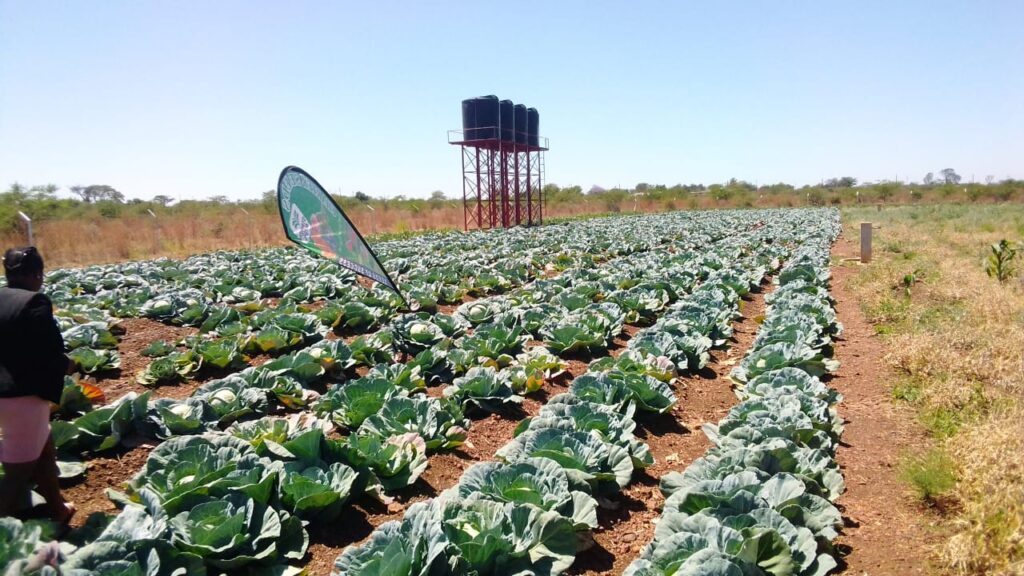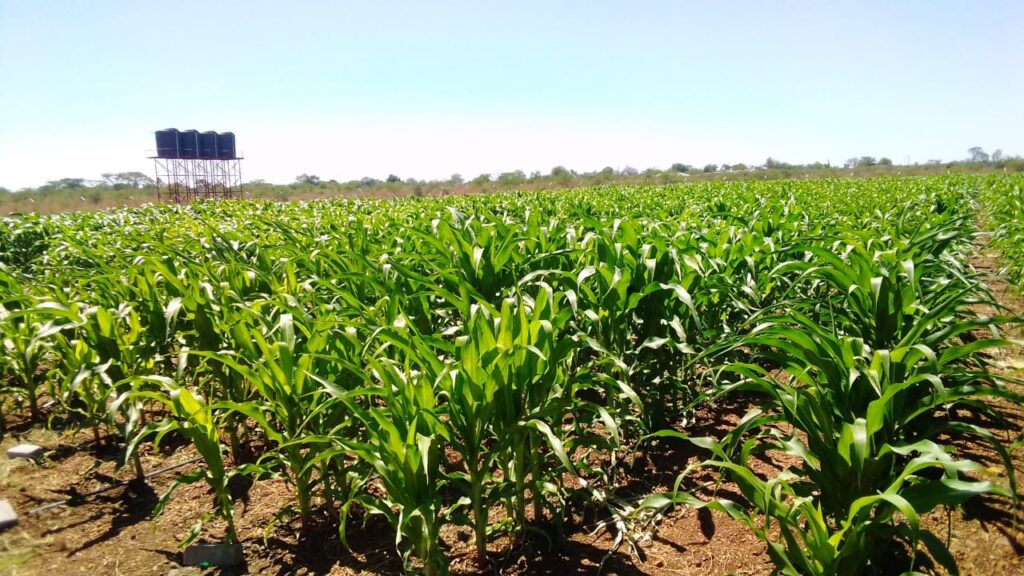By Delicious Mathuthu
As the adage goes, “give a man a fish and you feed him for a day but teach him how to fish and you feed him for a lifetime”, so has Welt Hunger Hilfe (WHH) in partnership with the World Food Programme (WFP) through establishing a horticulture project for the disadvantaged members of the Gweru urban community in order to ensure food security and improved general livelihoods.
Recovering from the effects of the COVID-19 pandemic, and incessant climate change effects in urban and peri urban communities in Zimbabwe, a six member Gweru Progressive Farmers gardening project has been established on a one hectare plot at the Gweru City Council Go Beer farm.
With a thriving maize and cabbage crop the project is giving a gleam of hope for the group. Starting from cash-based transfers to backyard gardens, and now a fully fledged 10 000 square meter solarised gardening project with overhead tanks, a drip irrigation system and perimeter fence to protect the crops, members of the Gweru Progressive Farmers project say they expect an average of between US$6 000 and US$7 000 from the two main crops they are currently managing, apart from the peas, vegetables and other side crops.
As one approaches the garden site where the one hectare garden project has been established, an attractive maize green landscape greets the eye and beyond another cabbage blue green belt can be seen demarcated by a khakhi belt of drying peas, which however, did not do as good due to missed disease control.
The garden project Secretary General and Director Operations, Charles Mittawa Mlauzi, says it was not all rosey to get to where they are today.
“This project started when we were being given cash-based transfers by the World Food Programme. Then vakazoona kuti (they realised that) when they go away vanotisiya tisina chekuita (they will leave us with nothing to do) and they said no, lets build projects.
“So there are different projects that were started including poultry and so on, and we were doing gardens. Not many people did gardens because the manual labour involved is quite demanding.
“We did backyard gardens during the COVID-19 period, they came and inspected them and saw that tirikugona, vakataura ne council kuti tiwane (we are doing good and they talked to council for us to get) this area and we started preparing the land; then they put up this infrastructure,” Mlauzi said.
The project was initiated around 2022, with 25 group members, each cultivating their own portion of land within the perimeter. Due to the demanding labour and other factors, the number dropped to 12 members and later six, which remain, that is when they decided to merge and work as a unit.
“The other time haina kutibatsira (it never helped us) because tayiita (we worked) as individuals.
“Yes takambokohwa kohwa (we harvest a little) as individuals, tikatengesa madomasi, tikatengesa ma cabbage but zvanga zvisina kumbonaka zvinhu zvacho izvozvo until vazviona kuti no, batanai tione (we sold some tomatoes, we sold some cabbages but the crops were not that attractive till they said no, we should work together),” added Mlauzi.
He said the project is now starting to generate some income.
“In terms of income, we are now starting to generate some, we sold peas for about US$50. We also are expecting to sell cabbages; actually they have been bought and they are coming to collect. We are expecting to get about US$2000,” he said.
In a joint newsletter on the Gweru Urban Resilience Building Project under which the garden project falls, the Swiss Agency for Development and Cooperation (SDC), WFP and WHH say over the decades, Zimbabwe has been experiencing various shocks and challenges that include climate change, floods, drought and crop failure, longstanding economic challenges and the impact of COVID-19 pandemic.
They said: “These have had negative consequences on the country’s resilience
capacities on macro, meso and micro levels.
To help strengthen urban communities against shocks, WFP and partners through WHH is currently implementing an urban resilience project in Gweru targeting 1500 households from seven wards.
“Assistance includes a variety of value chains namely; poultry production, detergents making, peanut butter making, mushroom production, horticulture, sewing, rabbitry which form the basis of their livelihoods. Households assisted benefit from capacity building initiatives that include starter packs, business entrepreneurship trainings, market linkages, climate smart agriculture trainings and technologies and protection services.”
Of the six members under the Gweru Progressive Farmers project, four are women and two men, which also speaks to women empowerment.
For one group member who is also the Treasurer, Esther Phiri, the garden project comes as a timely food security measure and livelihood relief.
“Tiri vana mai varikuchengeta vana so takatarisira kuti zvatinenge tarima zvitipewo pundutso pahupenyu hwedu tigone kubhadharirawo vana vedu ma school fees (We are women who take care of children so we expect to get relief from what we grow and get monies for school fees).
“Even inini pachezvangu mukati meimba yangu ndendichida kuwana chekudya (even for me within my household I expect to get enough food). So tinenge tichirimira kutengesa at the same time neniwo ndichirarama (so we are gardening for cash at the same time surviving from it),” she said.
Another female member of the project, Anny Rupiya Mangurenje, said the project is promising and they are now starting to sell vegetables on the side as they wait for their main crops to mature.
“So far hatisati tabata cash but at the same time tirikurima mibhedha yedu yatakaisa miriwo (so far we haven’t earned any cash… we are cultivating beds which we planted vegetables), I am no longer buying muriwo kumba (vegetables at home).
“Miriwo yatakarima wakawanda zvekutoti tokwanisa kuhodhesera vamwe varikunze since project yedu chaiyo chaiyo isati yatipa mari (we planted so much vegetables that we are now able to sell while we wait for our main crops),” she said.
Mangurenje said maize and cabbages are their expected big break.
“Takatarisa chibage chedu tirikutarisira kuwana mari (looking at our maize crop we are expecting to get cash) which is about US$4 000 average then for cabbages almost US$3 000,” she said.
During a field day at the project site recently, WHH Country Director Matthias Spaeth, said Gweru Progressive Farmers is an investment into commitment and passion for those less privileged but hungry for success, powered by purposeful collaboration.
“This is power of wise investments and strategic collaboration. With this project I think all of us have unfolded the potential and determined skills of people who needed nothing more than a chance to build a self-determined life and become a productive member of their community,” he said.
Spaeth thanked Gweru City Council, Government Ministries, WFP and the team who made the project possible.
He said the Gweru Urban Resilience programme’s success is due to the courage and commitment of the project members, adding that each group found the best fit for their passion.
“The project engaged in 10 different value chains to find the best fit for the local context, skills, tenates and the interest of the people,” he said.
Spaeth said the resilience programme focused on strengthening existing institutions in communities to amplify and improve their lives, saying the Go Beer Progressive Farmers gardening project is such good example.
Source: The Guiding Star.




